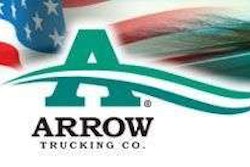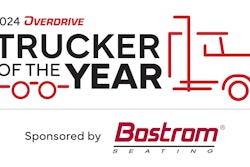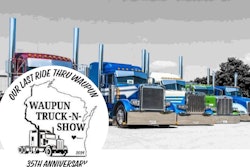 Arrow Trucking Co. trucks sit in a storage area in west Tulsa.
Arrow Trucking Co. trucks sit in a storage area in west Tulsa.
Arrow Trucking closure has industry-wide effects
By Misty Bell and Todd Dills
In the wee hours of New Year’s Eve, 54-year-old Schneider National driver Robin Reese was about to go hook a nearby load destined for New York City. Having breakfast at the TravelCenters of America location on I-84 in Maybrook, N.Y., she overheard drivers talking.
One was an Arrow Trucking driver who’d been trying to get home for more than a week because the Tulsa, Okla.-based flatbed carrier had abruptly ceased operations. On Dec. 22, a recording was placed on the company’s telephone, instructing stranded drivers on what to do with their trucks. Arrow executives could not be reached by the media and the Arrow website was down for days.
“I said, ‘Where are you headed?’” Reese recalls. “‘Green Bay, Wis.,’ he said.” Green Bay is the headquarters for Schneider.
“I told him, ‘Schneider sent us a message over the Qualcomm to look for you guys,’ so I picked him up and took him home.”
The 28-year-old Arrow driver, who wished to remain nameless pending litigation against his employer, had dropped his truck as instructed at a Boston dealer and had only $8 when she met him, says Reese. The dealer manager was off for the Christmas holidays, so the driver set off to find a ride on his own.
“He took a bag of clothes and left everything he owned” in the truck he turned in, says Reese. He’d made it to the layover in Maybrook with a trucker who’d said he could take him as far as Ohio.
Seeing Reese could get him all the way home, he went with her on her delivery that morning and was invaluable in helping her negotiate a difficult customer’s location. “If it hadn’t been for him, I wouldn’t have gotten out of New York,” she says.
“We try to help each other but sometimes we just get too busy with our own lives. Helping him out was really great for me. I told him, ‘It was a bad ending of the year for you, but it looks like you’re going to have a good New Year.’”
Assistance efforts
As soon as Arrow shut down, drivers, fleets and truck makers began offering assistance for drivers needing help to get home.
Daimler Trucks North America offered a bus ticket or $200 cash to drivers who turned in their Freightliner or Kenworth trucks at Freightliner dealerships, and Navistar offered the same for drivers with International trucks. “We’re a good corporate citizen, and it’s the holidays,” Navistar spokesman Roy Wiley told the Christian Science Monitor.
Schneider National driver Reese’s story, too, “has a happy ending in more ways than one,” she says. On their way to Schneider’s Gary, Ind., terminal, the Arrow driver learned that the manager of the Boston dealer had lined up a U-Haul for him to drive back to Green Bay. Hearing he’d already found a ride for himself, the dealer arranged to ship his items home.
Social media networks were filled with offers of help. On its Twitter feed, Swift Transportation said it was “willing and able to help all Arrow drivers.” The Owner-Operator Independent Drivers Association began a Facebook page, “Support for Stranded Arrow Trucking Drivers,” that quickly swelled to a membership of more than 7,000 people either needing help or seeking to provide help. The Truckers News Twitter feed was packed with drivers offering assistance in various parts of the country.
Even with these efforts, stories of stranded drivers still trickled in after the holidays. On the “Support for Arrow Trucking Drivers” Facebook Page, a couple stranded in El Paso, Texas, was trying to get to Cincinnati to be with their daughter, who was hospitalized with possible stomach cancer. The couple was still looking for a ride home as of press time.
Also of concern to many of the drivers associated with the assistance efforts was the whereabouts of John “J.R.” Eischens, who reportedly contacted his mother to ask for a bus ticket a few days before Arrow shut down. According to the Tulsa World, Eischens knew something was amiss when his last two Arrow paychecks bounced.
“John only worked for them for about a month,” said Marie AuBuchon, a driver for KLLM Transport Services (Jackson, Miss.), in an interview with the World. “He would have had no money for food or shelter.”
Eischens’ truck was found at a truckstop in Montana on Jan. 5, his keys turned in to the staff. His family filed a missing persons report the same day.
Repercussions
On Dec. 28, at least 30 former employees of Arrow filed a class action complaint in the U.S. District Court for the Northern District of Oklahoma, seeking compensation under the Worker Adjustment and Retraining Notification Act, which requires employers of companies with more than 100 employees to provide 60 days notice of shutdown.
Violators can be sued for two months of pay per employee.
The complaint also alleges that the company failed to fund fuel cards and bounced employee paychecks in December. Plaintiffs charge that Arrow failed to forward insurance premiums to carriers, despite deducting them from paychecks, and did not reimburse out-of-pocket expenses.
“This is the most egregious violation of the WARN Act and state wage payment laws that I have seen in my practice,” said plaintiff attorney Charles Ercole, who estimated the claims for the class action suit could reach $15 million. “The hardship imposed on these employees is outrageous, and we intend to vigorously prosecute this action.”
The Federal Motor Carrier Safety Administration on Jan. 1 issued an emergency order for Arrow to get its trucks and cargo to safe locations. If the company and its executives failed to comply with the order, they would be subject to equitable relief and civil penalties.
Additional lawsuits were pending at press time, including one from the People’s Bank for $810,056 for defaulting on a promissory note; Around the Clock Freightliners for $69,408 for fraud and breach of contract; and Shapes/Arch Holdings LLC, in the aluminum extrusion business, for $41,314 in U.S. Bankruptcy Court.
Arrow itself finally filed for bankruptcy Jan. 8., leaving drivers’ hopes for claiming expenses and bounced paychecks up in the air. Various media, meanwhile, reported that FMCSA regulations requiring employers to obtain background information on drivers may have precluded Arrow drivers’ quick hiring by other companies, given the lack of contact at the company. However, FMCSA released a statement debunking that notion.
Multiple companies stepped up with offers to hire. “All the major carriers — we’re all willing to help the drivers,” Mike Hitchcock, a vice president with Knight Transportation, told the Tulsa World. “Everybody has room for some.”
Jill Dunn also contributed to this report.
FYI: News Briefs
ATC opens new complex
The Around The Clock Freightliner Group built a new 200,308-square-foot complex along Interstate 20 in south Dallas. The site features extra-wide driving lanes, several hundred truck parking spots and more than 30 trailer parking slots, along with a pet park with 10 kennels. The 183,088-square-foot Building A includes the retail, service area, parts sales and warehousing, training facilities and administrative offices. Building B is 17,220 square feet and houses the truck sales department.
Joplin Petro wins award
National Institute of Automotive Service Excellence awarded the Blue Seal of Excellence to Joplin Petro in Joplin, Mo. The program identifies repair facilities with a large percentage of ASE-certified professionals. The Joplin Petro:Lube was awarded the Blue Seal of Excellence in July 2009 with 80 percent of its service technicians having at least one ASE classification. The facility also has eight ASE Master Technicians on staff and four service writers who are ASE certified.
Kenworth extends rebate
Kenworth Truck Company announced that it will extend a rebate program with the Owner-Operator Independent Drivers Association through 2010. The program offers a $1,500 rebate to OOIDA members on qualifying purchases of new Kenworth trucks equipped with large sleepers. Buyers must show their OOIDA membership card to their Kenworth dealer at time of purchase in 2010.
TA opens new California location
TravelCenters of America recently opened a new store on I-5 at Lake Isabella or Laval Road in Wheeler Ridge, Calif. The new center features 24 fueling positions under the canopy. Inside, diners can choose from Burger King, Pizza Hut, Taco Bell, Subway and Popeye’s Chicken. The center has a 4,000-square-foot convenience store and a TA Café Express that serves breakfast sandwiches, pastries and deli sandwiches.
October trade decline slows
Trade using surface transportation among the United States and Canada and Mexico dropped 15.5 percent to $61.4 billion in October 2009 compared with a year earlier, according to the U.S. Department of Transportation. October’s North American Free Trade Agreement decline was less than September’s decrease of 20.2 percent, DOT said. Trade increased 7.2 percent in October from September.
November Tonnage highest in a year
The American Trucking Associations announced that its advance seasonally adjusted For-Hire Truck Tonnage Index increased 2.7 percent in November, after a 0.2 percent decrease in October. The latest gain boosted the seasonally adjusted index to 106.4, its highest level in a year.

Highway program extended to Feb. 28
Staff Reports
The U.S. Senate on Dec. 19 authorized an extension of the current highway program until Feb. 28 as part of the 2010 Department of Defense Appropriations Act.
The final 88-10 vote occurred on a motion to concur with the House version of H.R. 3326, meaning that it was not amended by the Senate and allowing it to go straight to President Obama for his signature. Prior to the final vote, members agreed to waive any applicable violations of budget provisions by a vote of 63-35. The House recently passed H.R. 3326 by a vote of 395-34.
Senate leaders and the Obama administration have backed an 18-month extension mostly on the grounds that it would give Congress ample time to consider long-term changes in highway programs, including financing. But House transportation leaders, led by House Transportation & Infrastructure Committee Chairman James Oberstar (D-Minn.), have resisted that idea, saying Congress should not wait so long to deal with vital infrastructure and safety challenges.
Oberstar and other House transportation leaders have drafted a full six-year bill that would make significant changes in highway programs, including a mandate for electronic onboard recorders and creation of a clearinghouse of positive drug and alcohol test results.
The 2005 surface transportation bill — the Safe, Accountable, Flexible, Efficient Transportation Equity Act: a Legacy for Users (SAFETEA-LU) — expired at the end of September, necessitating a three-month extension that expired in December, prompting the latest two-month extension.
In addition to providing $626 billion to the Defense Department for the budget year that began almost three months ago, H.R. 3326 also waives fees on Small Business Administration loans and increases to 90 percent the portion of such loans guaranteed by SBA.
 ATA officer says building roads will help economy
ATA officer says building roads will help economy
Staff Reports
Investing in highways is the quickest, most efficient way to create jobs and restore the economy, American Trucking Associations Past Chairman Charles “Shorty” Whittington told President Obama at the recent National Jobs Summit.
“We must make a long-term commitment to highway investment in order to give construction companies certainty that when they hire new employees or buy new equipment, the investment will pay off,” said Whittington, president of Grammer Industries in Grammer, Ind. “This can’t be achieved through a one-time shot in the arm. We need a multiyear investment.”
Trucking is a $660 billion industry, transporting nearly 70 percent of all freight tonnage moved in the United States. Moreover, the industry employs directly or indirectly nearly nine million people in the United States, or one in 15 civilian workers.
The recession hit the trucking industry particularly hard, as truck shipments contracted 25.5 percent from March 2008 to April 2009. Since the low point in April 2009, the number of loads has risen only modestly, and recovery remains fragile.
“Infrastructure spending makes U.S. businesses more competitive,” Whittington said at the summit, held Thursday, Dec. 3. “Every dollar invested in the nation’s highway system yields $5.40 in economic benefits as a result of reduced delays, improved safety and lower vehicle operating costs. In fact, if highway bottlenecks were eliminated, the trucking industry could save $19 billion every year. That’s more money we can invest in putting people to work and buying new equipment.”
Whittington joined other chief executive officers, small business owners, labor leaders and nonprofit executives at the White House jobs forum, allowing Obama to hear ideas on how to grow the economy and put Americans back to work.
Diesel price watch
Prices are the average, self serve, cash at truckstops December 1-31, 2009*
ALABAMA 2.67
ARIZONA 2.77
ARKANSAS 2.71
CALIFORNIA 2.90
COLORADO 2.72
CONNECTICUT 3.01
DELAWARE 2.77
FLORIDA 2.79
GEORGIA 2.65
IDAHO 2.86
ILLINOIS 2.82
INDIANA 2.65
IOWA 2.69
KANSAS 2.73
KENTUCKY 2.69
LOUISIANA 2.66
MAINE 2.88
MARYLAND 2.79
MASSACHUSETTS 2.83
MICHIGAN 2.78
MINNESOTA 2.77
MISSISSIPPI 2.63
MISSOURI 2.61
MONTANA 2.75
NEBRASKA 2.68
NEVADA 2.81
NEW HAMPSHIRE 2.76
NEW JERSEY 2.68
NEW MEXICO 2.75
NEW YORK 2.95
NORTH CAROLINA 2.71
NORTH DAKOTA 2.84
OHIO 2.74
OKLAHOMA 2.60
OREGON 2.53
PENNSYLVANIA 2.87
RHODE ISLAND 2.77
SOUTH CAROLINA 2.56
SOUTH DAKOTA 2.71
TENNESSEE 2.63
TEXAS 2.67
UTAH 2.86
VERMONT 2.93
VIRGINIA 2.60
WASHINGTON 2.95
WEST VIRGINIA 2.84
WISCONSIN 2.80
WYOMING 2.66
Source: T-Chek Systems Inc., Eden Prairie, MN.
For more information, (877) SOS-CHEK or www.tchek.com
*Some prices may not include certain state taxes
Port study finds air quality improvement
Staff Reports
Air pollution from ships, locomotives, trucks and other Port of Long Beach-related sources dropped significantly from 2005 to 2008 — including a 21 percent decrease in diesel particulate matter — a new air quality study shows. The biggest part of the improvement came thanks to cleaner technology, not from a slowdown in cargo.
The 2008 Air Emissions Inventory reports that while the amount of cargo moving through the port declined by 3 percent in 2008 (compared to the baseline year 2005), air pollution was cut much further due to efforts to reduce emissions from vessels and vehicles that operate at the port. Overall, it was the port’s best air quality report card since the studies began in 2002.
Air quality initiatives such as the Clean Trucks Program, which began in October 2008, the expanded Green Flag vessel speed reduction program, the use of low-sulfur fuel for ships and the first use of shore power for ships at berth all have contributed to significant air improvements at the port.
“I’m very encouraged by this study,” says Nick Sramek, president of the Long Beach Board of Harbor Commissioners. “Speaking as a resident of the Westside of Long Beach, this is a critical public health issue for our community. It’s imperative that the port meets or exceeds the aggressive goals in our Clean Air Action Plan.”
The CAAP, adopted in 2006, set a portwide goal of reducing air pollution by 45 percent by 2012. This study hints that the goal could be met even sooner, Sramek says. “We had a major Clean Trucks milestone … on January 1, 2010, when several thousand additional dirty trucks [were] banned from shipping terminals,” Sramek said. “With this and other programs now in place, there’s no doubt we’ll meet the CAAP goal by 2012, and probably much sooner.”
In addition to the 21-percent drop in diesel particulate matter, the 2008 Air Emissions Inventory also showed a 12-percent decline in smog-forming nitrogen oxides (NOx) and an 18-percent drop in sulfur oxides (SOx). Greenhouse gases were cut by 7 percent. Trucks serving the port emitted about 20 percent less pollution overall compared to 2005. For oceangoing vessels, there was a 26-percent drop in diesel particulate matter emissions.
 ATA seeks court action in port concession plan
ATA seeks court action in port concession plan
By Jill Dunn
At press time, the American Trucking Associations was seeking a summary judgment for some of its challenge of the Port of Los Angeles Concession Plan in court.
On Jan. 5, the ATA filed its final response brief in U.S. District Court for the Central District of California. A summary judgment would allow a court to decide some or all issues before trial if there is no legitimate dispute over the facts surrounding those issues.
Among the association’s requests is asking the court if the concession agreement has a sufficient impact on motor carrier rates, routes and services to fall within the federal pre-emption provision.
In mid-March, the court will have a trial for the two sides to debate legal issues.
The association stated the court is not analyzing this case on a blank slate because the issue had been the subject of two previous decisions in the same court and one from the U.S. Court of Appeals for the Ninth Circuit. In the last of those opinions, the Central District of California issued a preliminary injunction barring the port from implementing many of its concession agreements related to motor carrier prices, routes or services.
A significant point of contention is the port’s requirement barring leased owner-operators. Port of Long Beach began a similar Clean Truck Program in October 2008 but did not require port truckers be employees. On Jan. 4, the port announced it had achieved its clean air goals two years ahead of schedule.
Still, the Natural Resources Defense Council and Sierra Club filed suit Dec. 29 in the California Superior Court in Los Angeles regarding their plan. The plaintiffs contend an agreement between the ATA and the Long Beach Harbor Commission could illegally reverse efforts to improve air quality in area communities.
The groups say the new agreement gives ATA authority to oversee future updates to the Clean Truck Program at Long Beach even if the port is acting to protect public health and safety.
The arrangement requires the port to receive ATA’s approval before making changes to the program or risk ATA filing a lawsuit. The groups say the private agreement, entered into Oct. 19, violates Long Beach Municipal Code and state law, which require public involvement and an environmental review.
The plaintiffs said the Long Beach Harbor Commission has denied requests to examine potentially adverse health impacts under the new agreement as required under the California Environmental Quality Act and has entered into the agreement without public approval by the Long Beach City Council.
Events
Feb. 5-6, Mid-West Truck Show and Convention, Peoria Civic Center, Peoria, Ill. Sponsored by Mid-West Truckers Association. www.mid-westtruckers.com/truckshow.html.
Feb. 18, Annual Oyster Feast, Bull Roast and Trade Show, Martin’s West, Baltimore, Md. Sponsored by Maryland Motor Truck Association. (410) 644-4600, www.mmtanet.com.
Feb. 27-March 3, The NATSO Show, Caesar’s Palace, Las Vegas. Sponsored by NATSO. (888) 275-6287, www.natso.com.
March 25-27, Mid-America Trucking Show, Kentucky Exposition Center, Louisville, Ky. www.truckingshow.com.
If you have a trucking event you would like to publicize, send information six weeks in advance to Truckers News Events Calendar, P.O. Box 3187, Tuscaloosa, AL 35403, or e-mail [email protected]. Truckers News makes no guarantee that information submitted will be published.









